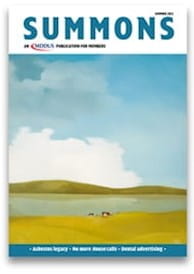 JAMES Doake brought a unique perspective to the job of in-house solicitor at MDDUS when he started in 2008 – that of an adversary.
JAMES Doake brought a unique perspective to the job of in-house solicitor at MDDUS when he started in 2008 – that of an adversary.
In the eight years after starting out in law in 2000 (formally qualifying in 2006), James worked exclusively for claimant solicitors doing family law, personal injury cases and later representing patients pursuing clinical negligence cases against doctors and dentists. His “change of allegiance” – not untypical of solicitors working for medical and dental defence organisations – offered the Union valuable insight into the way claimant solicitors operate in pursuing clinical damages on behalf of clients.
“It’s useful to understand the sort of pressures claimant solicitors are under in terms of funding and how they run a claim. And what pressures they will be under from their client as well,” says James. “I think I also know better when a claimant is trying it on – just doing a hopeful letter of claim to see if anything comes back.”
Clinical negligence can be a rich source of revenue for law firms working on “no win no fee” agreements (also known as conditional fee agreements or CFAs) with the basic principle being that a client is not charged by a solicitor for time spent working on a claim unless it is successfully settled or won in court.
“A firm might investigate 10 claims but only advance three or four of them because the others fall short of the necessary legal liabilities,” says James. “So you know the cases they do advance have to make a lot of money. Often defendants don’t appreciate why legal fees can be so high.”
Dual interests
It is the job of James and the other solicitors at MDDUS to assess alleged clinical negligence claims against our members and decide on the best course of action in answering these claims. Sometimes the legal and clinical details of such cases can be very complex. Certainly a basic understanding of biological processes can be a help in medical or dental cases.
James took his first degree in physiology at Edinburgh University. He then went on to do two years of postgraduate study in law at Leicester and then York.
“Biology was my main interest and I toyed with the idea of being a doctor but it never seemed right for me,” he says. “Law was a bit of change – but I wanted to specialise in medical law to keep my interest in both areas.”
The job at MDDUS proved the perfect match for his ambitions as a lawyer. Based in our Pemberton Row offices in London, James also provides legal support and representation to doctors and dentists subject to GMC and GDC actions or at coroner’s inquests or other proceedings, but 60 per cent of his job involves case law – from dealing with letters of claim all the way through to potential court hearings.
Forming a view
In a typical case a member having received a letter of claim will first get in touch with an MDDUS adviser. The adviser will get the member’s initial response and might solicit the opinion of a clinical expert. This information would then be passed on to James or another solicitor to form an initial view on whether the claimants have a reasonable case.
“We would also review the file and provide advice about how much we think it needs to be reserved for in terms of estimated damages,” says James.
“Depending on how severe the injury is you consider what effect it’s had on the claimant. Have they had to stop working as a result? Care claims can be a big part of it – if someone requires 24-hour care in an extreme example then you know it could be in the millions. But it’s a fairly broad brush exercise at this stage.”
Other important factors that must be considered are liability and causation. Was the member responsible for a breach of care of duty and if there is proven negligence did it have an adverse impact on the patient?
Says James: “You have to review all the opinions and decide whether you think it’s a vulnerable case that we may lose if taken to trial. And if it is clearly a case where we are in trouble in both breach and causation then we would always advise early commercial settlement. But we would explain this to the member and would always try to settle a case with no admission of liability – and sometimes with a confidentiality clause if appropriate.”
In dispute
In cases that can be disputed James will draft a letter of response denying breach of duty and causation, based upon the member’s comments and the expert reports. It is then sent to the member to check for factual accuracy and to ensure they are happy to proceed on that basis. The ball is then in the claimant’s court in terms of the decision to issue formal court proceedings but that still doesn’t mean a hearing is inevitable.
“It’s very rare to go to trial these days,” says James. “Only about one per cent of cases make it to court, if that.”
Legal reforms over the last decade or so have been aimed at avoiding the need for costly trials. A key stage in the process is the case management conference, which is arranged by the court with only legal representatives in attendance. It is normally held by phone, except in high court cases, and will involve the solicitors along with the barristers or QCs lined up to argue the case in court.
“At that meeting you agree directions for the management of the case – and exchange witness statements and expert evidence so no one is surprised by what the other side has,” says James. “The main purpose is to try to narrow down issues without going to trial, to cooperate and find constructive ways of settling the case.”
James admits that managing a case can be a game of nerves with both tactical and commercial considerations in the balance. “Going to trial is extremely expensive,” he says. “You are talking hundreds of thousands of pounds in legal costs.”
Sometimes cases can settle right up to the week or day before a court date. “One of my cases was settled on the morning of the trial,” says James. “It’s not an ideal system. But your job is to look after your client’s best interests. That’s the primary focus.”
Going to trial
In cases where neither side yields James will prepare the case for trial – get all the evidence together and liaise with all the parties to ensure they attend and all the proper documents have been served. During the trial he will discuss tactics with the barrister or QC between sessions – how things are going and what questions need to be asked of the claimant’s experts or other witnesses. He will also advise the member on their appearance in the witness box.
“We tell them what to expect and how to come across – what kind of information to offer. You run through the main issues and what to be prepared for in terms of cross examining and questioning. But you can’t coach too much; you can’t tell a member what to say.”
No matter how well prepared a legal team is for any case there is always a risk in going to trial, says James. “The judge can find for either party on the day. It just depends on which expert he prefers.”
So for James the least desirable outcome is a dramatic day in court.
Jim Killgore is editor of MDDUS Summons
This page was correct at the time of publication. Any guidance is intended as general guidance for members only. If you are a member and need specific advice relating to your own circumstances, please contact one of our advisers.
Read more from this issue of Insight

Save this article
Save this article to a list of favourite articles which members can access in their account.
Save to library